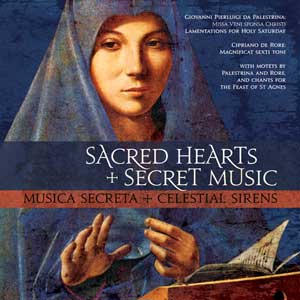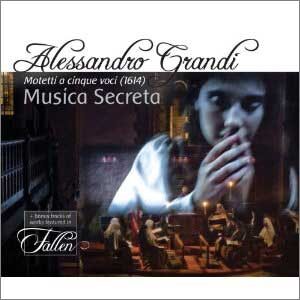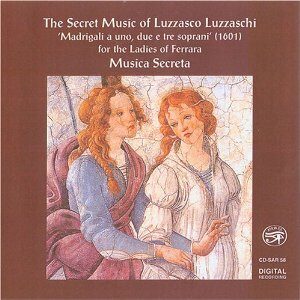Sacred Hearts, Secret Music
£10.00
- CDs
- CDs signed by Laurie Stras and Deborah Roberts
- Download available from our shop on Bandcamp
Description
Sacred Hearts, Secret Music offers our vision of music as it could have been heard in the fictional convent of Santa Caterina, the setting for Sarah Dunant’s new novel, Sacred Hearts. The year is 1570, when convents all over Italy brought glory to their cities through their music making. This disc contains both chant and polyphony, taking the listener through the timespan of the novel, from the depths of winter to the promise of spring at Eastertide. Some of the works recorded may be familiar from other, more traditional recordings, but you will not have heard them as they are here. Palestrina and Rore are given the full “Ferrara” treatment, with transposition, ornamentation and instrumental accompaniment. The Hildegard-like range and melody of festal chant is also featured, to correspond with the key points in the book’s narrative.
Additional information
| Weight | 0.088 kg |
|---|
Press reviews
Gramophone EDITOR’S CHOICE, NOVEMBER 2009
Get the book, get the CD. Yes, in what is either a clever marking idea or a genuine effort to provide a multi-dimensional artistic experience, this disc is the official soundtrack to Sarah Dunant’s book Sacred Hearts. Palestrina is placed alongside Rore and a sense of scholarship as well as intense musicality runs through the whole: fascinating and lovely. James Irvine
This is billed as a soundtrack: not to a film, but to Sacred Hearts, a novel by Sarah Dunant. The book – which I haven’t read – is set in a Benedictine convent in Ferrara in 1570. The music, which is a mixture of plainchant and polyphony, follows the span of the novel from Christmas to Easter.
The question of who sang the tenor and bass parts of the music that Vivaldi composed for the girls of the Ospedale della Pietà has been aired recently in Vivaldi’s Women, a television documentary that deserves a wider circulation on DVD. The programme showed that it was possible for women to sing the lower parts at pitch. In their booklet-note, Laurie Stras and Deborah Roberts propose different soloutions: first, to transpose those parts up an octave where necessary, with continuo instruments preserving the written bass. This works well in the Palestrina Mass, but the octave doublings in Rore’s Magnificat sound strange and unconvincing to my years. Much better is the second solution, followed in Surge, illuminare and the Lamentations: here the bass it taken only by the continuo. Stras and Roberts also advocate the ornamentation of solo lines. they apply this to the Mass, where it sounds both natural and beautiful; indeed the whole piece is an aural feast.
The plainchant is sung by permutations of the Sacred Hearts Schola – essentially Musica Secreta without the instruments – and Celestial Sirens, a fine amateur choir. The last item is Rore’s Regina caeli laetare, Frances Kelly’s harp weaving round the soprano line. Magical. Richard Lawrence
Classic FM Magazine ★★★★★ Exceptional
Author Sarah Dunant and her novel Sacred Hearts supplied direct inspiration for this compelling album of music that might have been performed by a convent of Ferrarese nuns in the 1570s. She recalls in her liner notes how discovering the work of Musica Secreta did much the same for the book’s development. The cross-fertilised fruits of their collaboration prove irresistible and, thanks to the honest-to-goodness sound of the recording and unaffected music-making, mercifully free from artificial additives. Highlights include a heartfelt performance of Palestrina’s “Veni sponsa Christi” and a sensuous reading of his Lamentations. Strongly recommended. Andrew Steward
International Record Review
Best-selling novelist Sarah Dunant’s Sacred Hearts is set in 1570 in Santa Caterina, a convent in Ferrara filled with noble women “married to Christ because they cannot find husbands on the outside.” When 16-year-old Serafina threatens to shatter the tranquility of the nuns’ lives, she is placed in the care of the scholarly Suora Zuana, but as they start to bond, two mysterious figures are watching …
In 2007 Dunant contacted Musica Secreta, which she had heard previously, with the idea of recording a “soundtrack” for the book. The result was a project that members Laurie Stras and Deborah Roberts in their extensive booklet notes say was “more about investigating possibilities than it was about looking for definitive performances.”
Musica Secreta was formed by Tallis Scholars’ member Deborah Roberts in 1990 in order to explore the late sixteenth and early seventeenth-century music written for female singers. It comprises four solo voices and a harp/organ/bass viol continuo; its previous releases include two recordings of music written for the famous concerto di donne of Ferrara, as well as by Barbara Strozzi and the nun composers Lucrezia Vizzana and Margarita Cozzolani.
Joining Musica Secreta for this disc is Celestial Sirens, an amateur and semi-professional womens’ voice choir based on the South Coast of England, also founded by Roberts. One of its purposes is to help Musica Secreta explore convent music. The idea in this instance was to avoid a preponderance of young women brought through the choral tradition who might have preconceptions about how the music should sound and instead form a mix of voices, both young and mature and with different levels of training, “but all competent and confident, imagining the sort of blend of skill and experience that one might find in a moderately prosperous convent.”
All this makes for an interesting and textured journey through Palestrina’s Missa Veni Sponsa Christi and Lamentations for Holy Saturday , Cipriano de Rore’s Magnificat and motets by the same composers, as well as chant for the feast of St Agnes. The density of the vocal forces varies; the solo voices in the Palestrina Mass ornament their lines; the bass parts are transposed up an octave while being played in their original pitches by a continuo instrument.
The performances are sensitively imagined and vividly realized interpretations; by no means perfect but all the more authentic for it. I especially enjoyed the contrasts between the delicate Alma Redemptoris Mater of Palestrina, in which the superb mezzo Clare Wilkinson is accompanied by organ and harp, and the following Lamentations , which feature the combined forces of Musica Secreta and Celestial Sirens together with continuo – still remarkably delicate but with a kind of muscular dignity that is extremely moving.
Moving also is the fact that this would have been founder member Tessa Bonner’s seventh disc with Musica Secreta. Apparently she enjoyed Dunant’s novels and was very excited about this project, She passed away in December 2008 and this recording is dedicated to her memory.
Robert Levett
Early Music Today
Sacred Hearts and Sacred Music, by all-female ensembles Musica Secreta and Celestial Sirens explores renaissance music that might have been performed by nuns (Divine Art dda25077). The music, with bass parts occasionally transposed, is interesting, beautifully sung and well recommended.
Music and Vision Daily CD Spotlight
This beautiful recital of sixteenth century music for female voices is a ‘sound-track’ to Sarah Dunant’s novel Sacred Hearts, the third in her Renaissance trilogy which was published in July 2009.
Set in 1570, this is the story of Serafina, a sixteen-year old girl who falls in love with her music tutor and refuses to marry into the wealthy Milanese family intended for her. As was quite common in those times, she was forcibly enclosed in a Benedictine convent in Ferrara where she discovers that her voice is not only her greatest gift, but is also her means of escape from the imprisonment.
This is then not only a recital that illustrates each phase of the book as its story unfolds, but is a celebration of the huge repertoire of music that must have been sung by a great many talented nuns within the confines of their orders and, no doubt, under the strong influence of the rules of a convent that would have its sisters rising from sleep every few hours to sing and to fast and inflict punishing restrictions on themselves. But the music is glorious, and the performances here are equal to the task of its recreation.
The performances are of great purity, as befits their presentation of Palestrina’s Missa Veni sponsa Christi and the Lamentations for Holy Saturday, in which there is discreet instrumental accompaniment.There are two groups of Antiphons and Responses among which the Sequenza in honore di Sant’Agnese is a notable highlight and a 1551 setting of Regina caeli laetare by the hugely prolific Cipriano de Rore, admired by many — not least Monteverdi almost a century later, as a progressive voice.
Musica Secreta is four voices with harp, organ and bass viol, formed in 1990 by Deborah Roberts. They are joined for this recording by her other groups, Celestial Sirens, a female non-professional choir of eighteen voices that came into being in 2003, and the sextet Sacred Hearts Schola, all centred in Sussex, south east England. This is a recording to be treasured and frequent playing will long be rewarding.
Patric Standford
The Observer
Inspired by Sarah Dunant’s new novel, Sacred Hearts, about a young nun in Renaissance Italy, this disc concentrates on music probably sung by convent choirs in the 1570s. This includes chant sequences of the kind written centuries earlier by Hildegard of Bingen, Palestrina’s “Missa Veni Sponsa Christi” and &dquot;Lamentations for Holy Saturday&dquot;, and motets by Rore. The excellent ensemble Musica Secreta specialises in music written for female voices and is joined by the Sussex choir Celestial Sirens. Performed without vibrato or unnecessary gesture, the CD wins out through pure sound, fervour and refreshing simplicity. Fiona Maddocks
OZ Arts Review
If you’ve come home after a terrible day at the office or, if you’ve spent hours in the kitchen getting the cake mix just right only to have it come from the oven a charred ruin, then don’t turn to Valium or take it out on the cat. There’s a much better option available.
It needs to be said at once, though, that the alternative offered could also be habit forming – but it’s an addiction that is entirely beneficial and can be thoroughly recommended. Toss the pills into the bin and give the cat his dinner – then put this CD on, sit back and let it work its soothing magic. An added bonus is that you don’t have to be musically literate – although that, of course, helps – to derive great listening pleasure from it.
Not the least of the many fine features of this recording are first rate liner notes which throw fascinating light on the lives and work of nuns in 16th and 17th century European convents where music, in inextricable association with prayer, was a constant companion in up to eight prayer services per 24 hours.
In the popular imagination, the notion of nuns regularly singing complex polyphony barely exists. So, this recording is timely if only for that reason.
Of course, the lion’s share of sacred vocal music was written specifically for male voices. A fair amount of this, though, was – and is – also sung by women. And if the range was too low, then it was not particularly unusual for the music to be transposed upwards to accommodate the available voices. This presentation goes some way to redressing these widespread misapprehensions.
As well, there is also a view that composers of the time wrote little vocal music specifically for women. But think of Vivaldi who spent much of his working life in an orphanage for girls for whom the Red Priest wrote innumerable works, instrumental as well as vocal.
The contents of Sacred Hearts and Secret Music are sung with an unpretentious artistry that allows the music to make maximum impact on the listener. It deserves to be heard by the widest possible audience; it is a most notable addition to the recorded canon of sacred music. Neville Cohn
www.new-classics.co.uk
Musica Secreta were formed nearly twenty years ago to explore the music sung by courtly women and courtesans of the late 16th and early 17th centuries. Over time, they have expanded this to include music that might have been performed by Renaissance nuns – and indeed in monasteries too – and are at the forefront of performance practice research in this repertoire. Sarah Dunant is the author of a recently plublished novel, Sacred Hearts, set entirely within a Benedictine convent in 16th Century Ferrara. She became enthralled by the music that would have been a crucial part of life in such a convent, eight services a day, seven days a week, praising God through chanting, psalms and song. The author saw Musica Secreta perform and it was decided to create a “soundtrack album” for Sacred Hearts, with each track marking a particular moment in the unfolding of the drama of the novel. The repertoire of music by Palestrina and de Rore featured might well have been performed by a convent choir in the 1570’s in the Ferrara area. Both composers were celebrated in their lifetimes in Italy and both were strongly connected to the d’Este family, rulers of Ferrara at that time. Musica Secreta are joined by Celestial Sirens, a select, non-professional female choir committed to the performance of choral works in the style of Renaissance and early modern convents. The CD comes with a booklet containing full tests, extensive notes and a foreword by Sarah Dunant. This is ethereally beautiful, haunting music, performed with grace and sincerity. John Pitt
Liverpool Daily Post
Sarah Dunant’s novel Sacred Hearts, about the nuns of Ferrara, has recently been serialised on Radio 4. She was inspired to write it after hearing the singing of the Sussex-based group Musica Secreta, who have researched the music of the nunnery, and its many parallels with the monastery.
The music which introduced the serialisation was sung by the group led by Deborah Roberts, and made quite an impact on listeners. It has now appeared on compact disc on the Divine Art label, and contains plain chants, and a Mass and Lamentations by Palestrina. Where other female textures may sound a little light, a tactful organ has been added, and this is an immensely relaxing experience from a highly professional group. Peter Spaull
You must be logged in to post a review.






Reviews
There are no reviews yet.